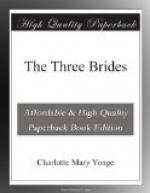“Quite true, Rector,” affirmed Herbert; “Joan has more brains than all the rest of us—for a woman, I mean.”
“For a woman!” repeated Mrs. Tallboys. “Let a human being do or be what she will, it is disposed of in a moment by that one verdict, ‘Very well for a woman!’”
“How is it with the decision of posterity?” said Jenny. “Can you show any work of woman of equal honour and permanence with that of men?”
“Because her training has been sedulously inferior.”
“Not always,” said Jenny; “not in Italy in the cinque cento, nor in England under Elizabeth.”
“Yes, and there were names—!”
“Names, yes, but that is all. The lady’s name is remembered for the curiosity of her having equalled the ordinary poet or artist of her time, but her performances either are lost or only known to curious scholars. They have not the quality which makes things permanent.”
“What do you say to Sappho?”
“There is nothing of her but a name, and fragments that curious scholars read.”
“Worse luck to her if she invented Sapphics,” added Herbert.
“One of womankind’s torments for mankind, eh?” said his neighbour.
“And there are plenty more such,” asserted Mrs. Duncombe, boldly (for these were asides). “It is only that one can’t recollect—and the men have suppressed them.”
“I think men praised them,” said Jenny, “and that we remember the praise, not the works. For instance, Roswitha, or Olympia Morata, or Vittoria Colonna. Vittoria’s sonnets are extant, but we only value them as being hers, more for what she was than for their intrinsic merit.”
“And,” added Eleonora, “men did not suppress Hannah More, or Joanna Baillie. You know Scott thought Miss Baillie’s dramas would rank with Shakespeare’s.”
Mrs. Tallboys was better read in logic and mathematics than in history, and did not follow Jenny, but she turned her adversary’s argument to her own advantage, by exclaiming, “Are the gentlemen present familiar with these bright lights?”
“I confess my ignorance of some of them,” said Julius.
“But my youngest brother knows all that,” said Rosamond at a brave venture.
“Macaulay’s school-boy,” murmured Lady Tyrrell, softly.
“Let us return to the main point,” said Mrs. Tallboys, a little annoyed. “It is of the present and future that I would speak, not of the past.”
“Does not the past give the only data on which to form a conclusion?” said Julius.
“Certainly not. The proposition is not what a woman or two in her down-trodden state may have exceptionally effected, but her natural equality, and in fact superiority, in all but the physical strength which has imposed an unjust bondage on the higher nature.”
“I hardly know where to meet you if you reject all arguments from proved facts,” said Julius.
“And the Bible. Why don’t you say the Bible?” exclaimed his wife in an undertone; but Mrs. Tallboys took it up and said, “The precepts of Scripture are founded on a state of society passed away. You may find arguments for slavery there.”




